‘It’s just a bad virus. We know masks don’t stop aerosols’. So said my doctor, whom I did not fire. Contrast this with my erstwhile doctor, who I did send packing: ‘We have to respect that there is a pandemic and masking is one way we have to help out.’
Doctors come in all shapes and sizes. Good and bad. Overall, during Covid mania, the profession failed us. Many doctors endorsed mask mandates, despite a dearth of evidence this would limit spread (masks are good at catching droplets, but not aerosols). Despite plenty of evidence of the harms that masking would inevitably cause. They backed lockdowns. But doctors are almost universally ill-equipped to perform the sort of vast cost-benefit analysis needed to even begin to comment on this radical and ruinous intervention only possible under the state’s monopoly on violence. I’d suggest nobody is equipped to perform this calculation. They gave unsolicited medical advice to people they had never examined. Lots of doctors made political statements, cloaking them with the authority of medical advice. Plenty of doctors broke from the profession’s most sacrosanct rules and principles and did so proudly.
Three egregious local examples of doctors betraying established medical ethical principles have earned my particular ire.
Mr Alastair and Dr McAlpine
I share some friends with one Alastair McAlpine. We grew up in Johannesburg at the same time. I’m told he was a keen debater. He became a paediatrician and now seems to practise in Vancouver, Canada. The man not only got caught up in Covid mania, he turned nasty.
His modus operandi has been consistent. He would cruise Twitter for anyone posting critically about vaccines. Then he’d dive in with haughty and unsubstantiated put-downs. And he was mostly wrong. When anyone questioned him or asked for his sources, he blocked them. And moved on to his next target.
While penning this piece, I was alerted to his latest hit job. This time on Helen Zille.
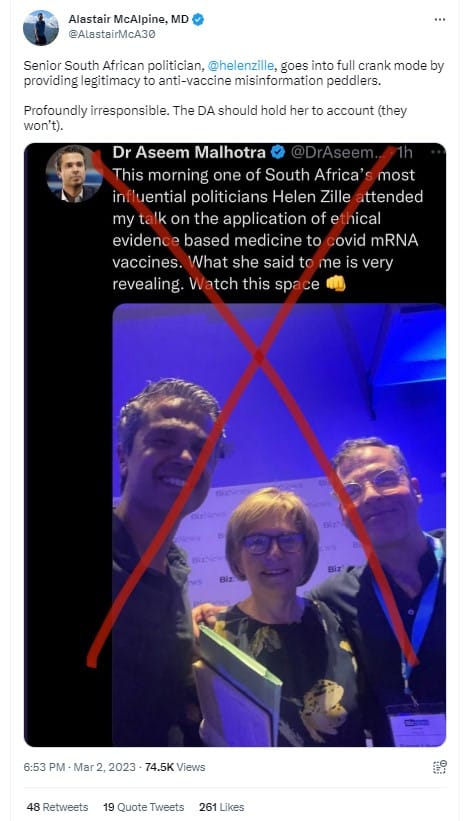
Here is his all-time greatest tweet (April 7th 2021). At the time of publication, the tweet remains live. McAlpine never had reason to believe that vaccines were anywhere near 100% effective at anything. That is why he refuses to post evidence. He simply drops in the hyperbolic, dangerous claim and digs in.

The ‘good’ doctor performed his usual trick on me. I tweeted a link to my piece questioning the Discovery vaccine passport system and he threw some baseless accusations at me. He was particularly ruffled by UK government data showing that in some age groups, vaccinated people were getting Covid at a higher rate than unvaccinated people. McAlpine sniffed this out and slid into my tweets. When he could not find any way to rebut me, he blocked me. And jogged on.
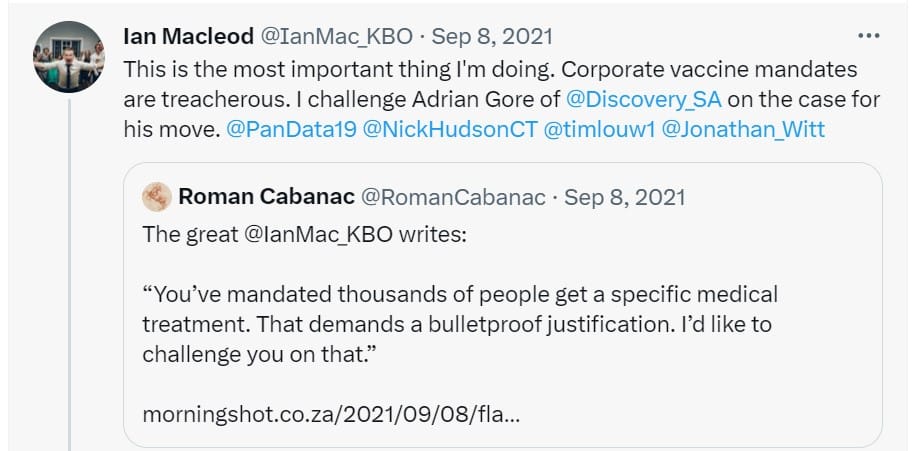
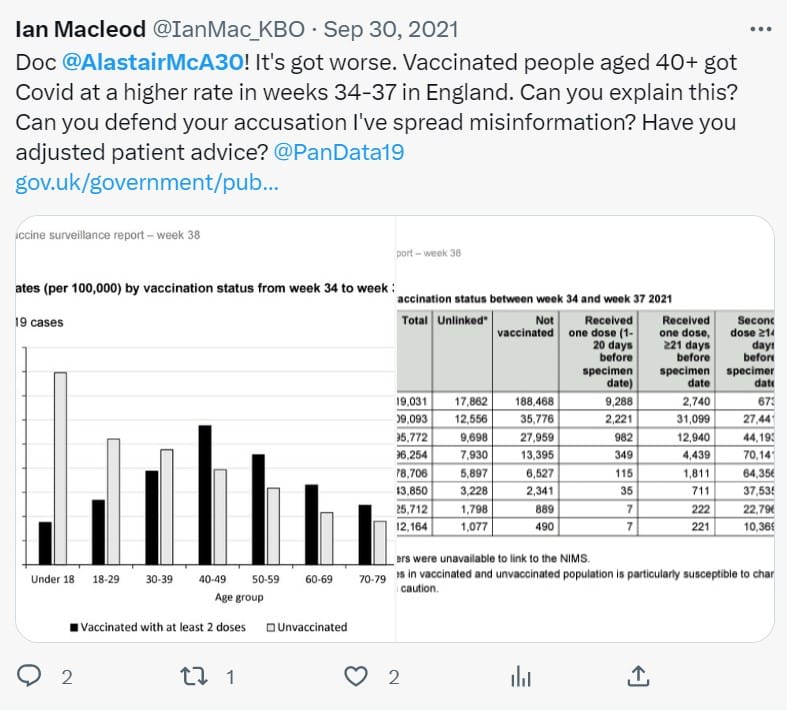

I’d suggest a simple remedy. The sort of thing that was obvious to everyone pre-mania. The relevant medical ethics body ought to examine the evidence, call in McAlpine for a hearing and, based on overwhelming evidence, sanction him. Regardless of particular rules, any sensible medical body must act against repeated and demonstrably false claims by a doctor.
Surgical imprecision
The Federation of South African Surgeons (FoSAS) has also fallen for the hysteria. This body is an overarching affiliation that represents common interests of the surgical fraternity. They list among these interests: surgical education, patient advocacy and social responsiveness, and marketing. The body comprises a number of surgical and medical associations, including the Association of Surgeons of South Africa, the Association of Plastic, Reconstructive and Aesthetic Surgeons of Southern Africa, and the Society of Neurosurgeons of South Africa. We’re talking about some hotshots.
Late in 2021 FoSAS issued a communication regarding Covid that does two things. It recommends people get Covid vaccinations before surgery, and it cites zero evidence.
The October 2021 letter recommends, inter alia:
- ‘All patients should be vaccinated against Covid-19 prior to undergoing an elective interventional procedure.’
- ‘Patients who are not vaccinated should be counselled to have the vaccination.’
- ‘If the nature of the clinical condition allows for a delay, the procedure should be delayed until optimal vaccination status is achieved.’
The reasons provided include: ‘Covid-19 vaccination has shown to significantly decrease the risk of acquiring Covid-19 infection and decrease the severity of such an infection in cases that do acquire it.’
The surgeons conclude by listing the aims of their recommendations, including: to ‘decrease the patient’s risk of acquiring Covid-19 prior to surgery’; ‘decrease the risk of unvaccinated patients transmitting Covid-19 infections to other patients and health care workers’.
For a moment, let’s ignore what the evidence is. The mere fact that surgeons have made a medical recommendation without citing a single source is unacceptable.
I challenged the secretariat to remedy this, sharing some of the evidence I have published on the Daily Friend before). The following came back to me:
Dear Mr Macleod
Thank you for your email which we previously referred to FoSAS members. The general response is summarized as follows
‘The FoSAS vaccination recommendation is a joint statement which is not prescriptive. Surgeons and patients have the right to choose whether or not they wish to be vaccinated themselves and whether or not they wish to treat or be treated by individuals who are or are not vaccinated as the case may be’.
Kind regards
I deem this a non-response. My query is why they were making the ‘joint statement’ without citing sources. They have merely reminded me that the statement is not prescriptive. They ignore my argument that a recommendation by a body of surgeons should be based on evidence.
Now let’s consider the substance of the recommendations. Published in October 2021, the evidence was already insufficient for this recommendation. Their unreserved claim that vaccines (without so much as discerning among the different sorts) universally and enduringly reduce the chance of Covid spread and lethality has never been defensible.
I’ll choose just one study to back my argument. Research by academics from Oxford, Edinburgh, and Swansea universities, published in the International Journal of Epidemiology, finds that within two to three months, the vaccinated have a higher rate of Covid hospitalisation and death. In their words, ‘For Doses 1 and 2 of ChAdOx1 [the Oxford, AstraZeneca vaccine] and Dose 1 of BNT162b2 [the BioNTech, Pfizer vaccine], VE/rVE [vaccine effectiveness/relative vaccine effectiveness] reached zero by approximately Days 60–80 and then went negative.’ That’s right – ‘negative’.

This is inconsistent with the FoSAS unsubstantiated claims, which they make with no caveats or any acknowledgement of conflicting evidence.
Physician, heal thyself
Finally, the South African Medical Association (SAMA), the Health Professions Council of South Africa (HPCSA) and major hospital group Netcare have joined the mania. They have responded with disdain (but not evidence) to a doctor, Susan Vosloo, who questioned vaccine safety on a recorded online discussion.
The relevant video is hosted on Bitchute and clipped here on Twitter.
Some of what Vosloo, a Cape Town-based heart surgeon, says is technical. I can’t comment on claims about damage being done at a ‘microvascular level’ or spike protein replication. Let’s focus on the portions that caused the popular uproar.
Vosloo made entirely sensible statements. She affirmed the need for informed consent in medicine. She says vaccines have risks and that there are some effective treatments for Covid. She reminds us that Moderna had never created a vaccine before this one and that all relevant pharmaceutical companies have a rich track record of misbehaviour.
SAMA has rebuked her, Netcare is disappointed and the HPCSA decided to investigate.
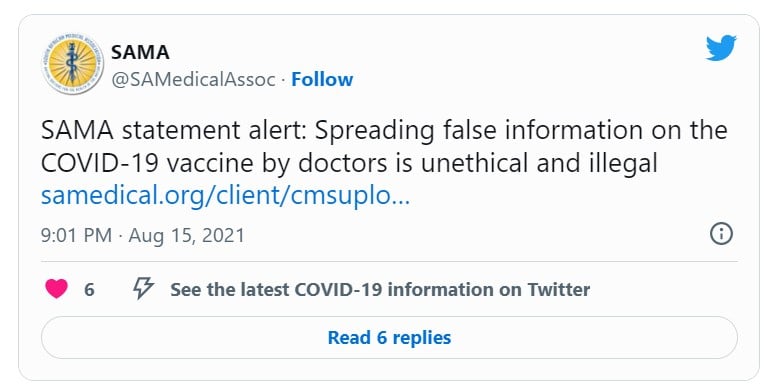
In their statement, Netcare tell us that they have ‘vaccinated more than 110 000 people including 33 000 healthcare workers’ and can deliver 5 000 vaccine doses a day. What they do not do is provide any evidence to contradict Vosloo.
I asked their PR people for evidence to back their claims, and was summarily brushed off.
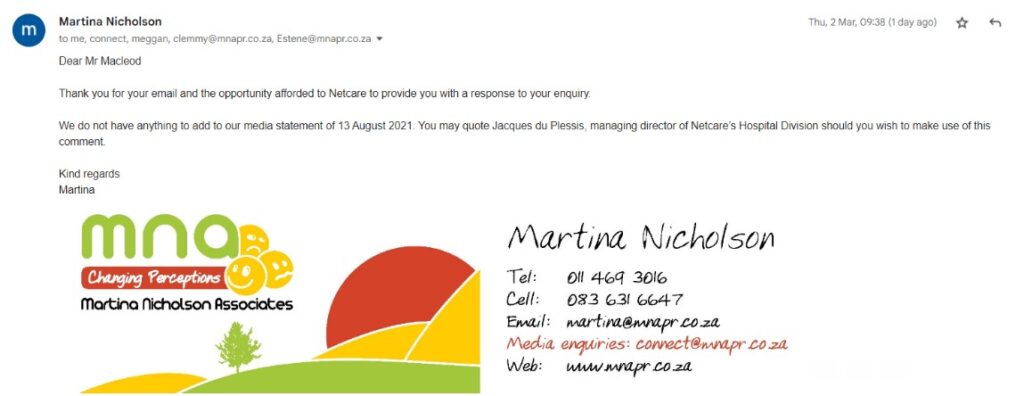
Vosloo’s discussion of the risks of vaccines ought not to be controversial at all. Every strong drug has risks. We are free to discuss those. We must be allowed to make decisions regarding our own treatment with informed consent. In the case of potent medicines using new technology, rolled out at warp speed, the discussion is all the more important.
Serious people no longer deny Covid shots come with risks. Heart damage is particularly well demonstrated. Consider this review study which found, among other things, that ‘Myocarditis/myopericarditis and pericarditis were the most common adverse events among the 243 reported cardiac complications, post mRNA COVID-19 vaccination’. One might call these rare. That’s a fair comment. It is the shutting down of critique that we must resist.
I have made use of published studies to demonstrates the risk of Covid vaccines more generally in prior stories on this site: See What Discovery isn’t saying about Covid vaccines and Vax mandates: three more reasons to keep fighting.
There is also evidence that shots are causing more harm than good in certain circumstances. As a recent study in the British Medical Journal puts it, ‘Booster mandates in young adults are expected to cause a net harm: per COVID-19 hospitalisation prevented’.
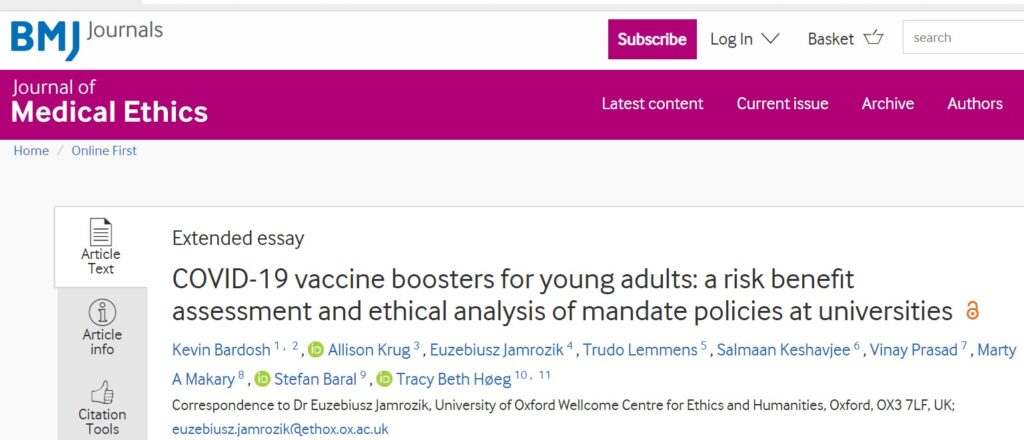
The HPCSA is welcome to investigate Vosloo. I can’t vouch for all of her claims. I ask only this of the medical watchdog: Will you investigate everyone who has made potentially problematic claims about the vaccines – whether favourable or not?
For example, doctors who claim vaccines are 100% effective. And surgeons who have suggested that vaccines reliably limit spread, without citing any authority or acknowledging opposing evidence. And hospital groups that refuse to tell us why they denounce doctors for expressing considered opinions. Will you ask them hard questions?
The views of the writer are not necessarily the views of the Daily Friend or the IRR
If you like what you have just read, support the Daily Friend

